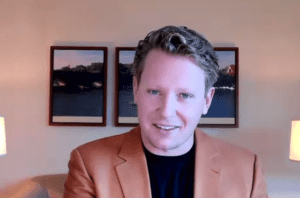Who is a member?
Our members are the local governments of Massachusetts and their elected and appointed leadership.

Author Eric Termuende discusses the importance of building trust and implementing even small changes during his MMA Annual Meeting keynote address on Jan. 21.
To navigate an uncertain future, organizations must work to boost trust and embrace a culture of change, work innovation expert Eric Termuende told local leaders during the virtual MMA Annual Meeting on Jan. 21.
Termuende, the bestselling author of “Rethink Work,” regularly speaks about the importance of making incremental changes — what he calls “one-degree” shifts — to remove the friction that holds organizations back. In his MMA keynote address, he shared examples of sports teams reversing losing streaks and companies boosting slumping sales by making a series of small changes.
“If we want to build incredible teams, if we want to be incredible leaders, and if we want to navigate an unpredictable future, it really comes down to three things,” Termuende said. “We have to build trust with the people that we work with, and with our friends and family, of course. We have to be able to remove friction, wherever it may arise … And we have to continue to experiment.”
A speaker, writer and podcaster about work culture, Termuende co-founded the NoW of Work, a Vancouver-based firm that helps organizations evolve in a rapidly changing work environment. Having studied workplaces around the world, he assists organizations seeking to build stronger teams, increase resiliency and innovate.
Organizations must build trust, he said, so that employees feel included and psychologically safe to engage and contribute ideas. He described five components of trust building: asking for help; learning more about colleagues; discussing ideas and creating; monotasking instead of multitasking; and slowing down so that people can listen to each other and connect on a one-on-one basis.
Termuende talked about Kevin Stefanski, the rookie head coach picked to lead the NFL’s underperforming Cleveland Browns in 2020. During the pandemic’s first wave, he convened players on Zoom and asked them to talk about their backgrounds and their “four Hs”: heroes, heartbreak, hopes and history.
“With each story, and with each piece of information, the understanding and the trust in each other started to grow,” Termuende said. “And when this trust started to grow, the cohesion and the strength of the team started to rise.”
That season, the transformed team reached the playoffs for the first time in 17 years and won its first postseason game in more than a quarter century. Reporters wanted to know what Stefasnki’s secret was.
“He said, ‘When my players trusted each other off the field, they played better together on the field,’” Termuende said.
Turning to his MMA audience, he added, “Here’s a question for you: Do you know who your players are off the metaphorical field, or outside of the office, so that you can play better together on the field?”
After building trust, teams need to remove friction – those factors standing in their way of success. Termuende referenced the historically medal-less British cycling team going on to win seven gold medals at the 2008 Summer Olympics and seven more in 2012. They did so by making a series of small behavioral shifts that included improving hand hygiene to reduce illness, and adjusting hotel room thermostats for better sleep.
“It’s the idea of taking the smallest amount of friction, and making that smallest change, over and over again,” Termuende said.
Organizations must be willing to experiment, Termuende said. Domino’s Pizza salvaged its reputation and pulled itself out of debt by trying new recipes and improving its delivery system and technology. The Canadian cereal brand Shreddies reversed sagging sales by embracing an intern’s marketing idea.
“If we’re enabled to, and if we’re allowed to, and encouraged to experiment, what that symbolizes is that we trust each other, and that failure’s OK,” he said. “It symbolizes that, really, we’re psychologically safe. We go from excluded to being included, to being able to learn, to being able to contribute, to being able to challenge.”
These principles have changed Termuende’s own life. When he was a University of Calgary student, he participated in a European travel competition that required him and his teammates to travel from London to Berlin using only cans of energy drinks as currency. After initial setbacks, they changed their fortunes by learning to trust each other, and by identifying the locals who would willingly help them with food, lodging and transportation in return for energy drinks.
“A small shift can have incredible results,” Termuende said.